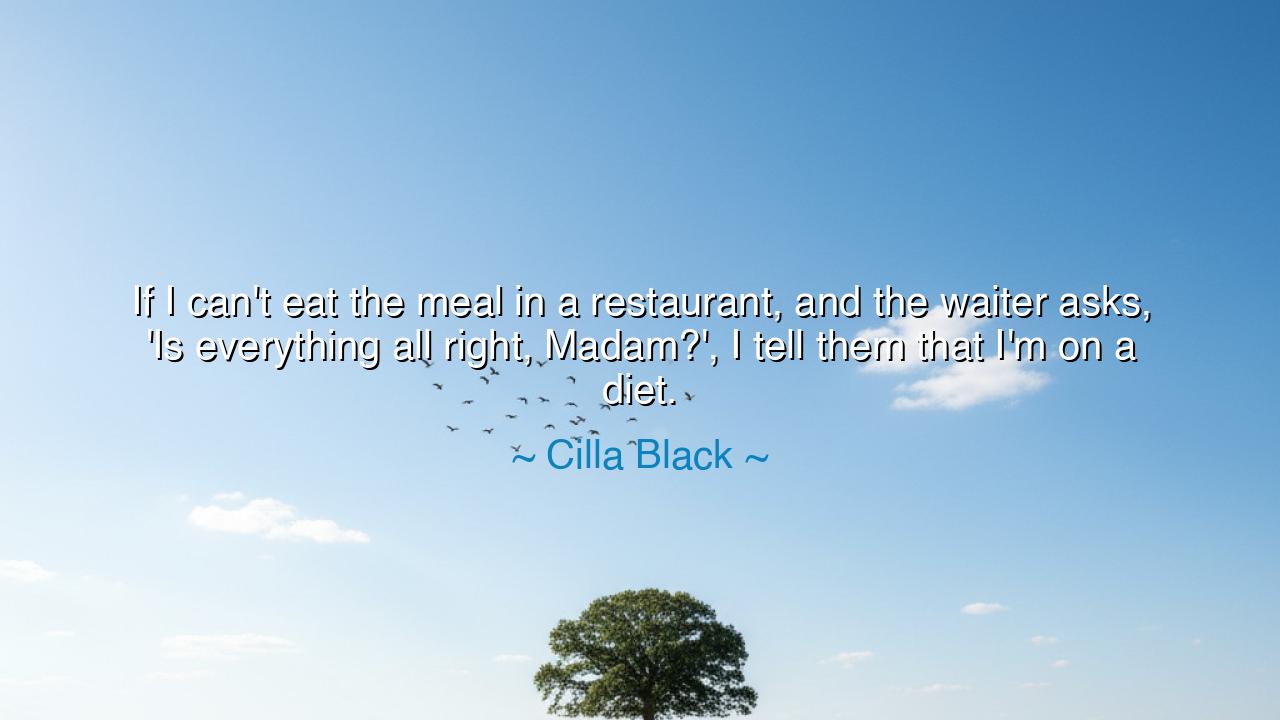
If I can't eat the meal in a restaurant, and the waiter asks, 'Is
If I can't eat the meal in a restaurant, and the waiter asks, 'Is everything all right, Madam?', I tell them that I'm on a diet.






In the words of Cilla Black, the beloved singer and entertainer, we find a statement that glimmers with both humor and hidden wisdom: “If I can’t eat the meal in a restaurant, and the waiter asks, ‘Is everything all right, Madam?’, I tell them that I’m on a diet.” Though wrapped in jest, these words unveil a truth known to those who walk the path of self-control — that grace, tact, and wisdom often lie in restraint rather than confrontation. For the ancients too understood: there is strength not only in bold speech but in gentle mastery of one’s own nature.
In this light, the quote is not merely about food; it is about self-governance, the art of choosing serenity over discord. When faced with dissatisfaction, the ordinary person complains or protests, but the wise one finds peace in composure. Cilla’s words, spoken with the wit of a performer who had seen the world’s many faces, remind us that self-discipline and grace are companions — that sometimes, rather than rebuking the world for what it serves us, we may simply turn inward and affirm our own choices. “I’m on a diet,” she says — not as an excuse, but as a symbol of inner sovereignty, of one who governs her body and her emotions alike.
In the age of the ancients, such wisdom was treasured. The philosophers of Greece, the monks of the East, the stoics of Rome — all knew the power of measured response. They taught that the one who controls their reaction wields greater might than the one who commands armies. Epictetus, the humble slave turned philosopher, once said that the essence of freedom lies not in changing the world but in mastering one’s own desires. So too does Cilla’s saying echo this truth: when faced with imperfection, she chooses not anger but humor, not blame but poise. Her diet becomes a metaphor for life itself — a reminder that we may decline what does not nourish us without bitterness or pride.
Consider also the story of Empress Josephine, wife of Napoleon Bonaparte, who was known for her gentle tact in court. Once, when served a dish she found distasteful, she smiled and quietly told her host that she was “avoiding such foods on her physician’s advice.” Her words preserved dignity for both herself and her host, and peace reigned at the table. What she withheld in criticism, she offered in grace. So it is with Cilla Black’s remark: beneath the laughter lies the art of handling discomfort with elegance. For to live well is not to avoid the unpleasant, but to face it with charm and understanding.
Cilla’s humor also carries the wisdom of self-awareness. To say, “I’m on a diet,” is to remind oneself of purpose — of a goal greater than momentary indulgence. It is a declaration that we choose what is right over what is easy. The ancients taught this as the essence of virtue: that the path of discipline, though quiet and unseen, leads to freedom. By her playful words, Cilla transforms a trivial moment into a mirror of the human struggle — between desire and restraint, appetite and intention. To diet, in this sense, is to live with awareness; to know what one consumes not only with the mouth but with the mind.
And yet, there is kindness in her response — a lesson in compassion and humility. For she spares the waiter embarrassment, just as the wise spare others from needless shame. The great teacher Confucius said, “The noble man is gentle in his correction.” He understood that harmony in human dealings is as vital as discipline in personal conduct. Cilla’s lightheartedness reflects this ancient balance: truth tempered by tenderness, self-control wrapped in laughter. Such is the art of the gracious soul — to correct without wounding, to decline without disdain.
Let this be the lesson to those who listen: that every moment in life, no matter how small, is a chance to practice mastery. When the world serves you what you cannot accept — a meal, a word, a fate — you may answer with bitterness or with grace. Choose the latter. Be as Cilla was: firm in your principles, yet gentle in your reply. Practice humor in hardship, and you will find strength where others find frustration. In doing so, you will embody the wisdom of the ancients — for you will have learned that true elegance lies not in what we consume, but in how we respond to what life places before us.






AAdministratorAdministrator
Welcome, honored guests. Please leave a comment, we will respond soon